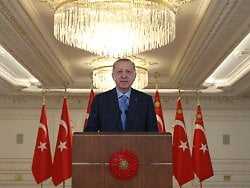Tilt the presidential system again
Turkish opposition pacts against Erdogan
2/13/2022, 4:13 p.m
In a referendum in 2017, Turkish President Erdogan secured almost unlimited power. Six Turkish opposition leaders are now forging an alliance to overturn the presidential system. They see this as the reason for the severe economic crisis in the country.
Six Turkish opposition parties have agreed on a strategy to replace President Recep Tayyip Erdogan. The common goal is to abolish the presidential system introduced by Erdogan and to strengthen parliament again, the party leaders said after a meeting. Turkey is in one of the deepest political and economic crises in its history. The main reason for this is the “arbitrary” leadership under the presidential system. Details of the agreement are to be published at the end of February.
Observers assume that the six parties, including the largest opposition party CHP and the national conservative Iyi party, will form an alliance and nominate a joint candidate for the presidential and parliamentary elections planned for 2023. The heads of the Islamist Saadet Party, the Democratic Party (DP), the Party for Democracy and Progress (Deva) and the Future Party also took part in the agreement. The pro-Kurdish opposition party HDP, which is under massive political pressure because of alleged terrorist connections, was not represented. CHP boss Kemal Kilicdaroglu rejected allegations on Halk TV that the HDP was being left out.
In April 2017, Turkey voted in a controversial referendum to transition from a parliamentary to a presidential system. Erdogan has been both head of state and government since his re-election in 2018 and has extensive powers. He can govern by decree, for example. Erdogan’s conservative Islamic AKP and the ultra-nationalist MHP have a majority in the weakened parliament.
Erdogan expects cheaper food prices
In order to get the high inflation under control, Erdogan announced a reduction in VAT on staple foods from eight to one percent for Monday. He expects the prices of rice, meat, fruit and vegetables, dairy products and eggs to fall by seven percent, Erdogan said in a televised speech on Saturday. The tax on flour and bread is already one percent. Inflation in Turkey had recently accelerated from an extremely high level. According to official figures, consumer prices rose by 48.7 percent in January compared to the same month last year.
The country is struggling with a currency crisis. The lira continues to lose value, which makes imported goods more expensive. At the turn of the year, energy prices had exploded. Electricity prices for households were raised by around 50 percent. Food and transport had also become increasingly expensive recently. In view of the situation in the country, people’s displeasure is also growing. There have been minor protests recently.
